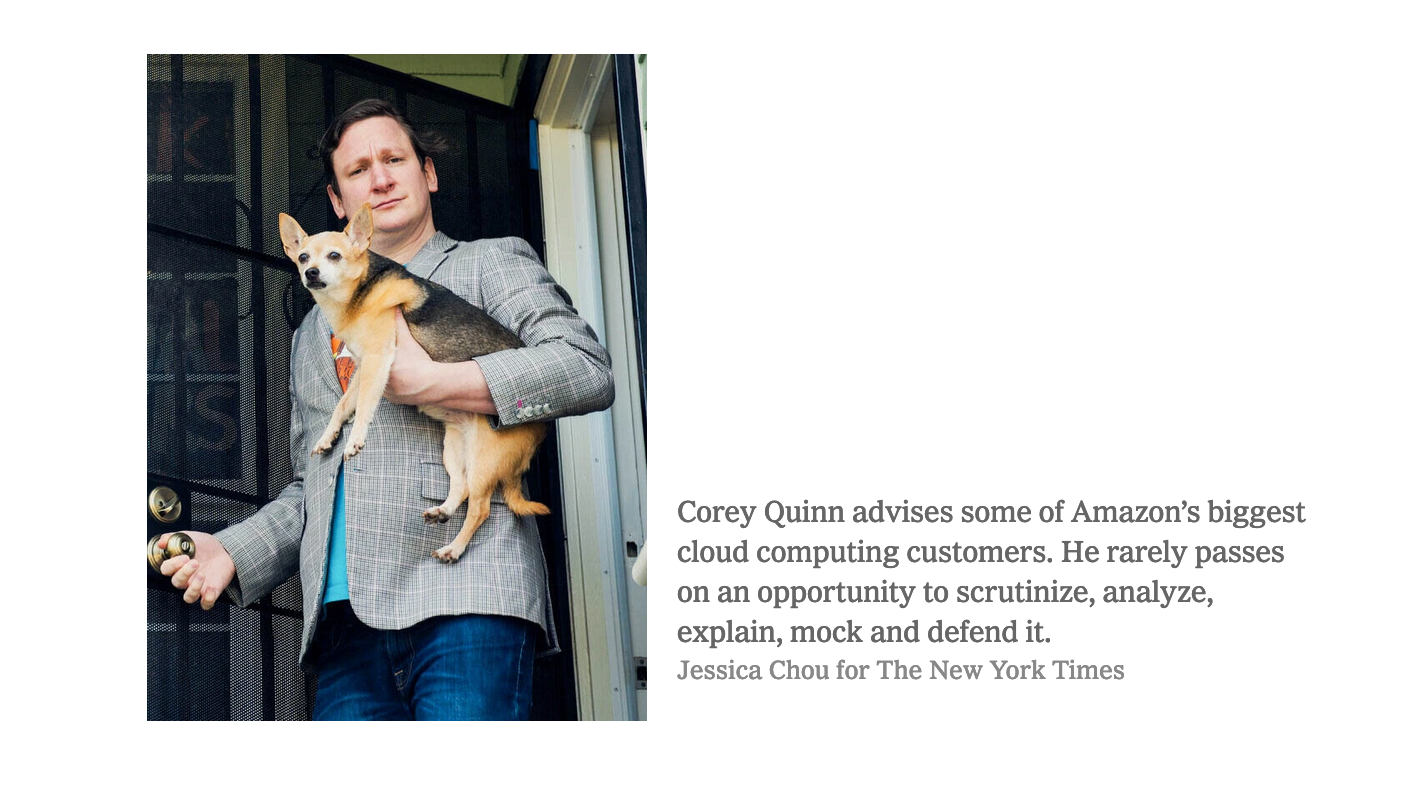It’s a longstanding tradition at AWS that whenever a news outlet publishes an article about something that annoys AWS—such as JEDI, their relationship with open source, or Bloomberg’s incredibly weird article—they write a “setting the record straight” blog post that lets them tell their side of the story in an environment that’s basically replaced a paywall with a bunch of links urging you to incur an AWS bill instead.
Rather than doing the smart thing and engaging with the reporter up front, AWS likes to wait until there’s something published, then frantically swing into “reactive mode” after the fact.
As AWS’s self-proclaimed Head of Marketing, I now do the same to the profile of me that the New York Times published last week.
Let’s take it point by point
First up, I think it’s a bit irresponsible of the New York Times editorial staff to publish this picture of me without clearly stating which mammal was me.
There are no doubt countless folks who were confused. “Me secretly being a dog who could type” wouldn’t have been the most shocking revelation in this article by a long stretch. That would instead be the reference to my client list, which is composed of Actually Serious companies.
Next, there’s been some feedback on Twitter that the statement “the world of cloud computing is not known for humor or outsized personalities” is inaccurate. This is fair feedback, and it’s a statement I gave almost verbatim to Dai (the reporter who authored this piece). I’m completely forgetting the comedic stylings of… uh… I know I had something for this, just give me a second.
After that, he contrasts me. “Mr. Quinn, 38, is an exception: a brash and outspoken person who is part tech analyst, part internet troll and part watchdog.” Again, this has the potential to confuse people. Calling me “part watchdog” doesn’t make it any easier to disambiguate which mammal I am in the picture at the top of the article.
“He rarely passes on an opportunity to scrutinize, analyze, explain, mock and defend Amazon’s cloud unit — sometimes all at once” is also patently untrue. When we look across the board at everything AWS does, if I weren’t to pass on over 90% of it, I’d never get anything else done. They ship many thousands of updates a year, each one an easy opportunistic target for all of those things. My Twitter feed is extremely active as it is; I’d start smacking into Twitter’s rate limits if I were to comment on EVERYTHING AWS does.
“It’s a frenemy relationship. When he speaks, people there listen,” said Ana Visneski, a former Amazon employee who often dealt with Mr. Quinn when she managed the process for releasing new products. “Although some people didn’t care for the snark.”
Ana is a treasure and a delight; for all of my coaxing / probing / attempted bribery, she never once broke NDA when she was at AWS. (As a point of fact, nobody at AWS ever has.)
Her departure from AWS last year made it clear that Amazon’s “Hire and Develop the Best” leadership principle is seriously missing a “retain” aspect; the company is very clearly poorer for her absence. As to folks at AWS not caring for the snark, you really can’t have the good without the bad.
Embrace the snark
A few observations to that end:
-
If I only say the positive things, I lose all credibility—just like AWS Marketing has. “Service X sucks and isn’t ready for production use” is often true; if I say otherwise, nobody will believe a single thing I say about Service Y, which is a legitimate treasure.
-
Do you have even the remotest idea how incredibly boring all of this is without humor? I’m not talking about you; I mean for me. I’d fall asleep by the third item every week and never send a newsletter if I weren’t constantly having to find new jokes, articulate what’s happening in a funny yet not-mean way, and showcase that for the world.
-
I’m aware that AWS vacillates between mottos—”opinions my own,” “no comment,” and “that’s not funny” being the top three. Amazon is famously “willing to be misunderstood for long periods of time,” but when you’re one of the largest companies on the planet, you don’t get that luxury anymore. If they say nothing, others will; I’m one of those others.
The thing that irritated me the most is that “Amazon declined to comment for this article, and it did not make Mr. Barr available for comment. In response to a description of Mr. Quinn as a funny person in an industry devoid of humor, an Amazon spokesman replied with a link to a lighthearted video for an AWS product launch and a smiley emoji.” (Just a side note here: if someone says “you’re not funny” and your response is a smiley face and a link to a video that is anything other than your critically acclaimed Netflix comedy special, you’re really just proving their point. The video in question is lighthearted and fun–for a corporate marketing video, by AWS’s normally remarkably stilted standards. In isolation it fails to stand up, because that isn’t its purpose. This is what is known to sports fans as an “own goal.”)
Pretending I don’t exist doesn’t make me go away. But this is classic AWS in a nutshell.
“Declining to comment” is their stock-in-trade, and this particular decision to not weigh in has led me to launching an @awsclown Twitter account that going forward will absolutely comment whenever AWS PR declines to do so.
Love me or hate me, it grows ever-harder to ignore me.
Taking the Times to school
Next, the article goes on to say that I “dropped out” of the University of Maine, where I was studying computer science. This is incorrect; I failed out where I was double-majoring in philosophy and computer science both.
However! I do have the distinction of being expelled from not one but two New England boarding schools for “teenage hijinks,” which really set me up for success later in life.
You might think that me bringing up these points does nothing to paint me in a positive light whatsoever. If you read the above-linked “Setting the Record Straight” blog posts from Amazon itself, you’ll realize that “harming my own case in a post like this” is very much on brand for AWS and folks in its orbit.
The article goes on to describe the AWS bill as “a confusing hodgepodge”—which is akin to referring to the asteroid strike that killed the dinosaurs as “a meteorite that bordered on the large side.”
Fun fact: when researching this story, Dai Wakabayashi asked if AWS bills were “complicated like phone bills.” When I responded with “no, AWS bills are complicated like differential equations,” he asked me to explain.
Four screenshots of my own bill and three minutes later I was asked to “please stop explaining”—after which point he had to go lie down for a while to recover. This description is a testament to his professionalism; few can suppress the screaming horrors after seeing what dwells inside the bill.
Misunderstanding Billie
Moving further along, there’s a clear misunderstanding of Billie the Platypus. He’s not “angry.” He’s just disappointed in oh so many different things, and he knows you can do better.
Around this point it was time to have a recognized Industry Figure weigh in on my shenanigans. Former AWS Marketing VP and current GCP marketing VP Brian Hall “said Mr. Quinn was a ‘very helpful advocate’ whose opinion mattered at Amazon.” Well well well, apparently you’re only allowed to say nice things about me once you no longer work at AWS; before then, everyone really, really hopes that ignoring me will make me shut up and go away. This seems unlikely to succeed.
Then this description of one of my slides going into terrible AWS product names is absolutely a crowning achievement:
“He called up a slide with the worst offenders: Lookout for Equipment; Trainium; Glue Elastic Views; SageMaker Data Wrangler; and Amazon Outposts, the Smaller Ones.”
See, at AWS they have a serious marketing focus on making sure that each service is prefaced with the correct-yet-seemingly-arbitrary “Amazon” or “AWS” preface.
This quote mostly dropped them, and of everything else I’ve ever said or caused to be said about AWS, it’s clear that this is the single thing that sends them into a fit of rage more than any other.
Lastly, the article focused on my rule of not mocking individuals, only large companies—and pointed out that Larry Ellison was an exception because “nobody likes him.”
I will point out that while I got a lot of feedback for this article; not a single person has come forward to suggest that this statement is in any way incorrect.
I believe that unlike everything else I’ve mentioned in this post, it requires no further comment.






